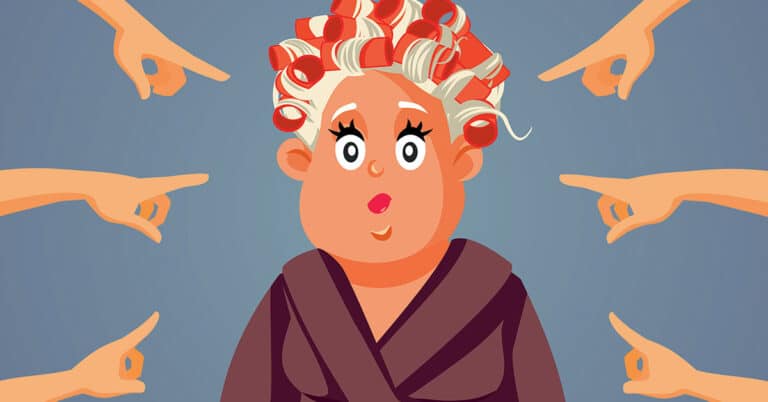

Have you ever wondered whether you're too quick to judge others? Do you often wonder how it might be affecting your life? No one likes feeling judged; it undermines our confidence, making us see the worst in ourselves and leaving us wondering whether we're not good enough. However, while it’s easy to say “don’t judge others,” it’s far harder to put this advice into practice for yourself.
Of course, it's impossible to refrain from making all judgments. However, if you tend to take a negative, simplistic view of other people then it's well worth thinking about how to change this default attitude. In this guide, we’ll take an in-depth look at why we judge others and explore how to stop judging people. Whether you’re generally quick to judge, are wondering why judging is wrong or know that being judgmental is damaging your relationships, we’ll help you gain a deeper understanding and suggest ways to develop positive new habits.
First, let's try to differentiate between acceptable and problematic approaches to evaluating other people. Here are six of the most significant warning signs that suggest you're unfairly judgmental:
You tend to define other people by their flaws, always letting the negative carry more weight. You also think of people in a very rigid way, seeing them as “all bad” or “all good”, struggling to accept an image of others that incorporate both good and bad.
If you unfairly judge people, this usually includes yourself (a topic we'll come back to in the next section). So, you likely have a harsh inner critic, holding yourself to high standards and assuming others do not value you.
You don't trust the motives of others, assuming they're out for themselves or want to hurt you. This means people have to work hard to earn your trust, and you may perceive those who are different from you as threatening.
You require things to be ideal and acceptable, so people are seldom able to please you. This perfectionism also means that you likely struggle to cope with inconsistency, especially in the behavior of others.
You make quick, strong judgments, not looking for the context around other people's actions. Consequently, you may easily move from the thought “This person did something I think is wrong” to the belief “This person is morally bad.”
As well as pushing people away after snap judgments, you may hear very little about the inner lives of those you are close to. Knowing you'll likely be unsympathetic, your loved ones may often avoid telling you their mistakes, as they could be trying to preserve your positive regard for them.
So, now that you have a clearer idea of whether (or to what extent) you tend to be unfairly judgmental, let's pause to consider what's going on in our minds when we take this sort of perspective on others. Crucially, psychological research has discovered that we commonly overestimate what a situation implies about the person in it. In other words, we downplay the influence of context and luck and focus on assessing the person's goodness, compassion, talent, and so on. This is especially the case when we don't know much about the person we're judging.
There's a good reason why our brains are wired to go in this direction. It helps us to spend the minimum amount of time making assessments as we move through the world trying to understand our surroundings. When this tendency is pronounced, however, we become unfairly judgmental. This may especially be the case when we are particularly busy, or we have a lot of stressors to sort through in our lives.
The other factor in play when we judge other people relates to how we feel about ourselves. A large part of our motivation for judging others is rooted in how we assess our own lives, thoughts, and emotions. Specifically, when we get the urge to judge someone, that urge often comes from something that we see in other people that subconsciously reminds us of things we don't like about ourselves. For example, if (deep down) you are aware that you have a quick temper, displays of anger from someone else may immediately make you want to push that person away.
Once we're aware of the two above reasons for being judgmental, we can make more consciously calculated, reflective choices about how we want to interact with others.
Now that we've considered the nature of unfair judgment and the thoughts, emotions, and beliefs that drive it, let's look at three powerful ways to approach reducing your impulse to judge people.
In many cases, you may find that just being aware of your judgmental tendencies helps you to curb them, boosting your ability to catch judgmental thoughts before they solidify into enduring beliefs. In particular, you'll have a chance to reflect on what you're thinking, instead of just assuming it's right. However, the following three habits will help to cement these types of changes, as well as increasing your self-knowledge more.

Most of us have the capacity for empathy, though it can come more naturally to some than others. If you want to reduce the amount of negative energy in your life and to cut back on your judgmental thoughts, it can be extremely helpful to actively work on cultivating empathy. The more you're able to put yourself in someone else's shoes, the less likely you are to view situations in a black and white, overly critical way.
A simple way to develop your empathy is to stop and ask “What is this person's motivation?” every time you feel yourself going into a judgmental mode. For example, if someone seems to be cold and distant, ask yourself why this might be the case. Perhaps they are afraid to get close to others because they have been hurt before. Once you shift perspectives in this way, you begin to see the person more positively, and with more compassion for their shortcomings.
We're particularly prone to harshly judging others when we have an underlying assumption that we are always right, or that our way of viewing the world is the only one worth entertaining. This type of close-minded thinking means that opposing viewpoints feel hostile and irrelevant, so it's obvious how we might then end up being excessively judgmental and dismissive in our interactions with others.
It's important to be actively curious about why people (including yourself) think the way they do. Everything that we experience shapes us, after all, from our upbringing to our school experiences and our cultural context. Look for the positives in other people's unique perspectives, challenging yourself to do this as often as you can. For every one you encounter, ask yourself what you can learn from them. This is extremely effective at reducing judgmental attitudes because it's difficult to be both critical and appreciative at the same time.

As noted above, how we judge others is how we judge ourselves. So, if you want to reduce your negative judgments, reduce the number of things you dislike in your own thoughts and feelings. Identify the things that you want to improve about yourself, and develop a plan for tackling each of them.
To return to a previous example, perhaps you might want to read a book about coping with anger, or you might benefit from setting up an appointment with a therapist. Self-improvement is a lifetime project, but even minor advances should be appreciated and commended.
The key thought here is just that the happier you are with yourself, the fewer negative things you have to project onto other people. Meanwhile, even just knowing your own weak spots helps you to see when other people are triggering your inner critic, which allows you to modulate those responses without being outwardly judgmental.
As suggested above, the ultimate cause of being quick to judge others lies at least partly in how harshly you criticize yourself. So, to stop judging others, you need to work on learning how to stop judging yourself. As well as making life less enjoyable, judging yourself limits your ability to use the Law of Attraction to its full potential. Consequently, you may align yourself with a lower vibration; focusing on the negative and attracting more of the same in all areas of your life.
